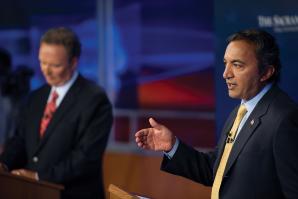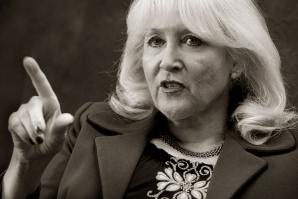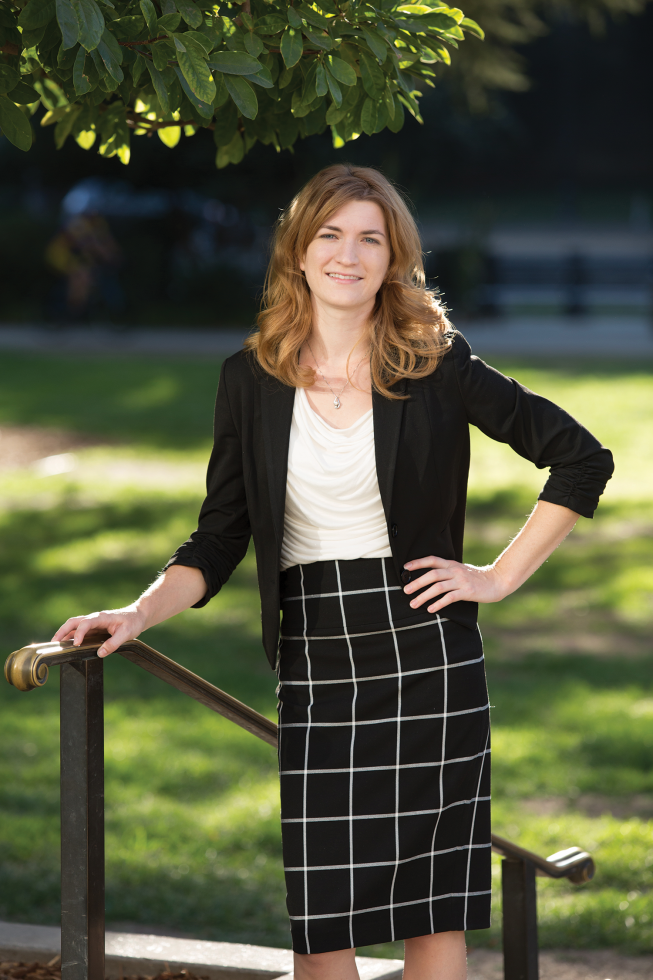At 25-years-old, Kaitlyn MacGregor is the new director of communications for the California Republican Party, and she has her work cut out for her. New data from the nonpartisan Public Policy Institute of California shows that young voters aren’t registering Republican and neither are moderates, African Americans or Latinos. With elections just weeks away, MacGregor will need to make strides quickly. Previously, she was the West Coast communications manager for Health Corps, a national nonprofit founded by celebrity doctor Mehmet Oz.
How did you land the job? You’re 25, and the position had been open for quite a while during an election year. Clearly you brought a key element the party was seeking.
A large part of what they’re trying to do is reflective of what I’ve done in the past, which is being able to find the good and the positive. A lot of people are very passionate and very interested in talking about how they feel, but they’re not necessarily supporting people across the board. I’m willing to get out there and share the party’s message, not my personal message. It was probably an important distinction between myself and the people I interviewed against.
How has your involvement in organizations like Metro EDGE prepared you for a director-level position?
They help not only in connecting you with people — you can never know enough people — but we also do a lot of things that give you insight into the minds of different people across your region. The Metro EDGE philanthropy committee just did a sit-down with the Sacramento Community Foundation to talk about philanthropy and how to engage young professionals. Listening to a lot of that gives you insight into what interests people in your community and how to engage them. Specifically around philanthropy, older generations have a tendency to want to write a check and see their annual report at the end of the year. Millennials want to see an immediate impact. They want to put their hands on it and know that they helped shape it.
Are you using that knowledge and your own experience to guide your communications strategy for the California Republican Party?
It’s a challenge. A large part of it is getting opportunities out there for younger voters to see people on the ground, be able to volunteer, be able to meet candidates, walk precincts, make phone calls and understand the issues. In the past, we haven’t necessarily made everyone touchable. Millennials are hard to reach in some ways. Social media is probably the easiest way to engage young professionals; it’s where we are. But it’s finding ways to get your message into their feed. And that’s a challenge for everybody.
The left has been more successful in humanizing their candidates. What tactics have they employed that the Republican Party has not?
Social media has played a big part. They’re pushing out pictures and videos and a lot of content that is showing volunteers and normal moments. The candidates are important, but they’ve made all the people behind those candidates important as well. For us to show the many different faces of the people who support our candidates is important because that shows our diversity, that shows who is engaged and who shares your beliefs. There has also been a tendency by both parties to focus a lot on the social issues, and that’s not to say that those aren’t important things, but a lot of what we need to get back to is remembering that there’s fiscal stuff behind all of this.
The Republican Party has struggled to pivot on its messaging and as a result has failed to engage with some voters. Where can you change course?
Young people are a big key. For a long time, the people who were engaged in the party’s higher positions were older. And it’s not that older people can’t be completely proficient at engaging social media, but typically they have a harder time with it. It really changed with President Obama’s election. The social media campaign for his first election was gold. We just couldn’t get there. We said, ‘He’s doing social media? We should do social media.’ But there was this sort of panic, and we just threw a bunch of stuff out there. There wasn’t real thought put behind how social media is used effectively. Older generations are not as likely to share content. They’ll look at it, they’ll see it and they’ll ‘like’ it. But liking something or favoriting something isn’t the same as re-engaging with it. But we’re making the right moves and are setting ourselves up to get there and to make the changes.
Who is the Republican candidate running this year in California who would have the most influence in changing perception of the GOP if elected?
Janet Nguyen (a Senate candidate from Orange County) is one I’ve been watching. She’s Asian and has a great story of pursuing the American dream. She is really a great representative of her community and wants to make sure they’re represented in the ways they should be. She’s definitely one to watch.
What’s your message for California’s GOP? Let us know in the comments.
Sick of missing out? Sign up for our weekly newsletter highlighting our most popular content. Or take it a step further and become a print subscriber — it’s both glossy and affordable!
Recommended For You

GOP on Deck
Can the Republican contenders overcome Brown in 2014?
With just over a year until the midterm elections, California’s next gubernatorial race is starting to take shape.

Is Sacramento Permanently Democratic?
Voter trends with lasting effects
The 2012 election may have spelled the end for a 30-year boomlet of Republican legislative and congressional representation in Sacramento.

Minority Status
Resolute leadership for a floundering GOP
Assemblywoman Connie Conway, a Tulare County Republican, made her presence felt immediately in the California Legislature.
Redistrict Remix
New district lines mark big opportunities
This year, for the first time in a decade, California is likely to see seriously contested races for Congress. That is because the new Citizens Redistricting Commission dismantled the 2001 congressional gerrymander that kept almost all districts safe for incumbent parties.




Comments
I hope she has limitless energy...she will need to breathe life back into this party!